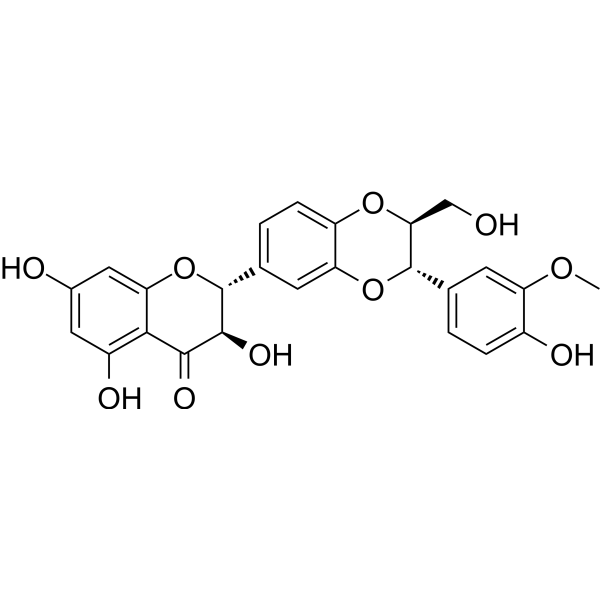
Silybin B
CAS No. 142797-34-0
Silybin B( —— )
Catalog No. M31655 CAS No. 142797-34-0
Silybin B is an effective inhibitor of raloxifene 4 '- and 6-glucosalylation, an effective anti-fibrinogenic and anti-oligomeric component of Silymarin, with free radical scavenging activity of 1, 1-diphenyl-2-pyridinyl hydrazine (DPPH), and a protective effect against cisplatin-induced neurotoxicity by alleviating DNA damage and apoptosis.
Purity : >98% (HPLC)
 COA
COA
 Datasheet
Datasheet
 HNMR
HNMR
 HPLC
HPLC
 MSDS
MSDS
 Handing Instructions
Handing Instructions
| Size | Price / USD | Stock | Quantity |
| 5MG | 295 | In Stock |


|
| 50MG | Get Quote | In Stock |


|
| 100MG | Get Quote | In Stock |


|
Biological Information
-
Product NameSilybin B
-
NoteResearch use only, not for human use.
-
Brief DescriptionSilybin B is an effective inhibitor of raloxifene 4 '- and 6-glucosalylation, an effective anti-fibrinogenic and anti-oligomeric component of Silymarin, with free radical scavenging activity of 1, 1-diphenyl-2-pyridinyl hydrazine (DPPH), and a protective effect against cisplatin-induced neurotoxicity by alleviating DNA damage and apoptosis.
-
DescriptionSilybin B is an effective inhibitor of raloxifene 4 '- and 6-glucosalylation, an effective anti-fibrinogenic and anti-oligomeric component of Silymarin, with free radical scavenging activity of 1, 1-diphenyl-2-pyridinyl hydrazine (DPPH), and a protective effect against cisplatin-induced neurotoxicity by alleviating DNA damage and apoptosis. Silybin B can inhibit the growth of human chronic myeloid leukemia K562 cells and induce apoptosis. Silybin B is a candidate compound for alleviating cisplatin induced brain nerve injury.
-
In Vitro——
-
In Vivo——
-
Synonyms——
-
PathwayOthers
-
TargetOther Targets
-
Recptor——
-
Research Area——
-
Indication——
Chemical Information
-
CAS Number142797-34-0
-
Formula Weight482.44
-
Molecular FormulaC25H22O10
-
Purity>98% (HPLC)
-
SolubilityIn Vitro:?DMSO : 250 mg/mL (518.20 mM)
-
SMILES——
-
Chemical Name——
Shipping & Storage Information
-
Storage(-20℃)
-
ShippingWith Ice Pack
-
Stability≥ 2 years
Reference
molnova catalog



related products
-
TCV-309 chloride
A highly potent and selective platelet activating factor (PAF) antagonist; inhibits PAF-induced aggregation of rabbit and human platelets with IC50s of 33 nM and 55 nM respectively.
-
Magrolimab
Magrolimab (Hu5F9-G4) is a humanized anti-CD47 IgG4 monoclonal antibody that exhibits antitumor activity by blocking CD47 and binding primarily to the N-terminal pyroglutamate of CD47. It can be used in combination with other compounds for the treatment of recurrent myeloma.
-
Norisoboldine
Norisoboldine might be a potential therapeutic agent for rheumatoid arthritis, and it functions through protecting joint destruction as well as regulating the abnormal immune responses.



 Cart
Cart
 sales@molnova.com
sales@molnova.com


